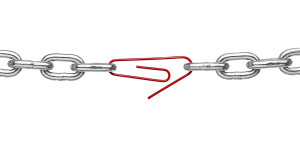Pop quiz: which is likelier to help build your career opportunities – your network’s strong ties (people with whom you have share professional interests and experience) or weak ties (people outside your professional sphere)?
Although it would seem like your strong ties would be the obvious answer, nope – it’s those weak ties that have been shown to do people the most good.
What Are Weak Ties?
Weak ties are connections with people in a completely different professional space, life circumstance, geographic region, or other unrelated sphere than those with whom you normally interact. So, for example, if you’re a digital archivist, another archivist would be considered part of your professional universe and thus a strong tie. On the other hand, a connection with your daughter’s soccer coach who also happens to be a corporate tax accountant would be a weak tie. The reference isn’t to how personally or professionally close you are to the individual, but rather how much your professional spheres overlap.
The Benefits of Weak Ties
Although both strong and weak ties are important to a resilient career, weak ties can be especially valuable for expanding your career opportunities. Why? Because this gives you access to a much wider and more diverse range of potential job opportunities than if you’re only operating within the same group of connections those in your network possess. That archivist friend most likely has a lot of the same connections you have, goes to the same conferences, and knows a lot of the same stuff you know. Sounds like a wonderful connection, and he most probably is! But that tax accountant? She probably knows an entirely different group of people, some of whom may represent otherwise invisible job opportunities for you to pursue.
This is especially important if you’re considering doing any sort of independent information work – the more diverse your network, the greater your number of potential clients. Why? Because your weak ties are likely to be far removed from the LIS profession, which means you may be the only person they know who possesses amazing information skills. When someone in their network asks if anybody knows how to organize and make sense of all their organization’s documents, you’re likely to be the first (and only) answer your weak tie comes up with. And as we all know, there’s nothing quite as powerful as a personal recommendation.
The Science Behind the Strategy
In “How to Build Your Network,” authors Brian Uzzi and Shannon Dunlap made an effective case for this approach in a 2005 Harvard Business Review article. Based on the original research on social networks undertaken by Mark Granovetter of Johns Hopkins University in 2004, Uzzi and Dunlap examined how information – and connections – flow based on the nature of those connections. (Most notably, they identified Paul Revere as an “information broker.”) Noted the authors, “networks deliver three unique advantages: private information, access to diverse skill sets, and power.” The broader the reach of your network, the stronger all of these benefits become.
So get to know – and establish connections with – as broad a range of individuals as you can. You never know when those weak ties may develop into strong opportunities, or when you can become a strong opportunity for one of your weak ties. After all, reciprocity is the key to building a dynamic, mutually beneficial professional community.

